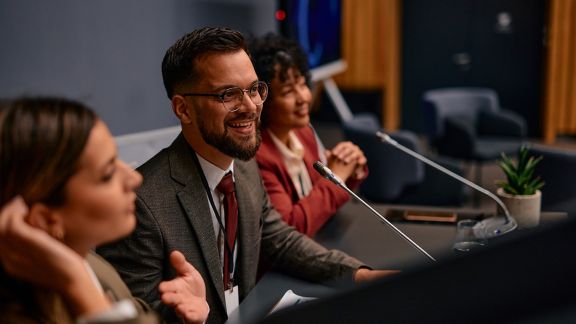International Law Enforcement Academies Program Evaluation

Problem
The Bureau of International Narcotics and Law Enforcement wanted to measure the effectiveness and impact of its flagship International Law Enforcement Academies program.
For nearly three decades, the International Law Enforcement Academies (ILEA) program of the U.S. State Department’s Bureau of International Narcotics and Law Enforcement (INL) has served as a cornerstone of U.S. foreign policy efforts to combat transnational organized crime, promote the rule of law, and foster international law enforcement cooperation. Through a global network of academies, ILEA provides critical skills, knowledge, and leadership training, and relationship-building opportunities to thousands of law enforcement and criminal justice professionals annually. Despite its reach and importance—spanning six academies and 110 countries in 2023 alone—the program has never undergone a comprehensive evaluation of its performance, impact, or contribution to international security and diplomacy. In an era of evolving global threats, understanding whether and how this longstanding initiative achieves its goals is both timely and vital.
Solution
NORC conducted a mixed-methods performance evaluation that included random assignment to course and complexity-aware participatory approaches.
NORC is implementing three separate but complementary evaluations between 2025 and 2028 to assess ILEA effectiveness and impact:
- A mixed-methods performance evaluation to describe the ILEA program’s results over the past 10 years in its six academies, assess achievement of objectives, identify opportunities for improvement, and provide evidence-based recommendations for increasing program effectiveness. We are using secondary data review, key informant interviews, and focus group discussions with current and former ILEA participants, ILEA instructors, INL DC and overseas staff, embassy representatives, and foreign law enforcement agency leadership.
- An impact evaluation to quantify the program’s effects on key outcomes including attitudes towards the United States and U.S. law enforcement, knowledge and skills to combat transnational crime, and foreign agencies’ perception of the United States as a partner. We are focusing on the five ILEA locations outside the United States and using a phased-in design to randomly assign ILEA training participants to courses and conducting multiple rounds of online survey data collection to examine how effects of ILEA attendance persist over time.
- A targeted assessment of past participants’ experiences with ILEA programs and program impact on their careers. NORC is using complexity-aware participatory approaches to understand the program’s contribution to participant careers, exploring factors contributing to success, and gathering stakeholders’ perspectives on the program’s impact on career advancement, decision-making, and professionalism. We will develop vignettes of successful ILEA participants and assess the program’s narrative evolution within the context of U.S., Department of State, and INL priorities.
This multi-pronged evaluation effort represents a key step toward ensuring the ILEA program remains effective, accountable, and aligned with U.S. strategic interests. By examining the program’s outcomes, impact on international cooperation, and influence on participants’ careers, the evaluations will provide evidence-based insights to strengthen the ILEA model and guide its future. More broadly, the project supports the public interest by helping the United States and partner nations work more effectively together to address global crime, strengthen justice systems, and build a safer, more just international community.
Result
NORC will provide actionable, evidence-based recommendations to enhance INL’s contribution to global law enforcement.
Our work on the three evaluations will comprehensively assess ILEA’s effectiveness, evaluating its impact on participants’ knowledge, attitudes, and collaboration with U.S. law enforcement in combating transnational crime, as well as the program’s contribution to their careers. Findings will guide future programming to ensure the program can enhance and continue its impact.
Related Tags
Project Leads
-
Alejandro Ome
Principal Research ScientistPrincipal Researcher -
Sarah Chamness Long
Senior Research DirectorProject Director -
Alexandre Monnard
Senior Research ScientistPerformance Evaluation Lead -
Greg Haugan
Research ScientistImpact Evaluation Lead -
Ridhi Sahai
Research ScientistMixed-Methods Specialist/Analyst











